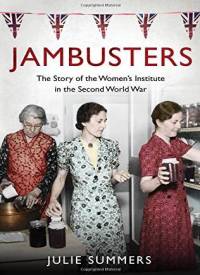With the outbreak of WWII the population of the English countryside almost doubled, with evacuees, military camps, key workers moved to the countryside away from the bombs, etc. The country had to adapt and women were central to organizing that adjustment. For the Women's Institute had the largest grass-roots membership of any women's organisation in the country and was bigger than all but the largest of men's trade unions.
However, when war was declared, membership actually fell. Younger women entered the forces or war work, or joined the Women's Voluntary Services. The WI had an anti war stance and they imposed restrictions on the participation of WI's in war work. However, they wanted to find a role and that included protecting and preserving the nation's larder. Before the war, Britain had imported twenty million tons of food annually, but eventually exports from the continent ceased. Everything not eaten immediately had to be bottled, jammed, canned or pickled, as food was scarce. The WI was asked to do much of this work, although crucially they were not entitled to extra petrol rations, which made the job much harder - to many eyes it looked impossible - but these women rose to the challenge.
This entertaining and interesting read covers all aspects of the WI's wartime life. The 'Dig for Victory' campaign, in which the WI was central in utilising every possible piece of land available. The author, for example, tells the story of one group taking over an elderly residents abandoned allotment. No men would help clear the land and made fun of the women who turned up to dig it - remarking they looked like 'hens scratching'. Jeers turned to surprise as the allotment eventually began to produce excellent quality fruit and vegetables. Even more amazing was that the food produced was not for the women themselves - but unselfishly sold at market or given to the country as a whole for purchase on the ration.
Yes, these women made jam - tons of jam, often under dangerous conditions, with bombing raids ahead. They collected wild herbs and fruits - as well as many, many other items for the war effort. They knitted, sent packages to Prisoners of War (among whom were often their own menfolk), to refugees and those suffering the blockades in Russia. They always saw their role as to help and, after the war, turned their attention to aiding women in 'Austerity Britain' and to those in Europe, including those in Germany who had previously been 'the enemy'. For women are always at the forefront of war and these women intended to help their country, their menfolk fighting and, after the war, as many people as had been affected by the war as possible. Their skills, commitment, hard work and organization was essential for the war effort and this book tells their quietly heroic story wonderfully.


